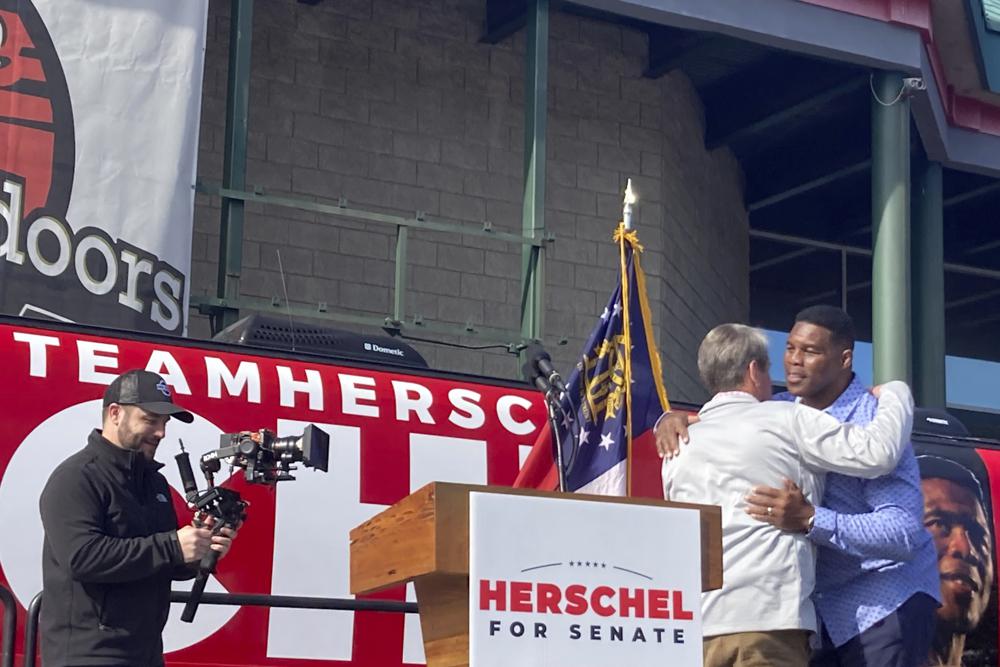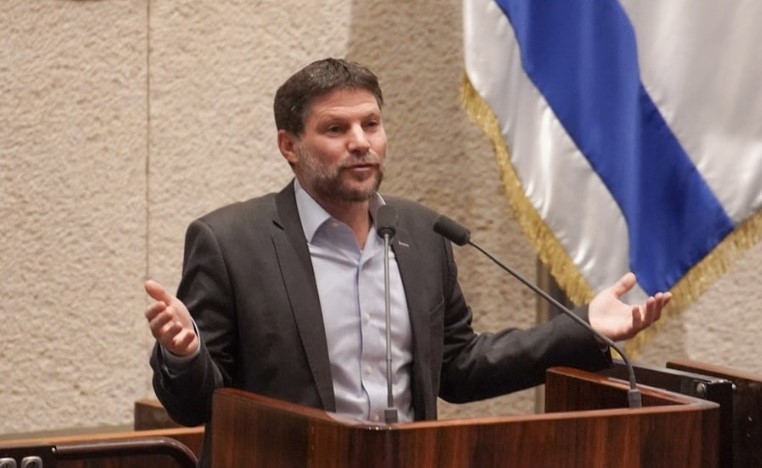Fresh off his commanding reelection, Georgia Gov. Brian Kemp on Saturday played the role of dutiful Republican soldier as he campaigned for the first time alongside Senate hopeful Herschel Walker after spending months steering clear of his ticket-mate.
The joint appearance reflects how important Kemp’s broad coalition will be in determining whether Walker can unseat Sen. Raphael Warnock in a Dec. 6 runoff. The fact it occurred only now underscores the challenges that Walker, a celebrity athlete turned politician, has had appealing to many independents and moderate Republicans amid an intense focus on his rocky past.
“We cannot rest on our laurels, everyone,” Kemp told a few hundred supporters standing in the parking lot of a gun store in suburban Atlanta, urging them to cast one more ballot in a midterm election year that was underwhelming for Republicans nationally.
Kemp was the top vote-getter in Georgia’s general election, drawing 200,000 more votes in his matchup with Democratic challenger Stacey Abrams than Walker did in his challenge to Warnock. The result: Kemp defeated Abrams by 7.5 percentage points, while Walker trailed Warnock by about 36,000 votes or almost 1 percentage point. Warnock fell just shy of a majority, however, triggering the four-week runoff blitz.
The governor campaigned throughout the fall mostly for his own reelection, though he made appearances with several GOP nominees for lower statewide offices. All of them won without runoffs. The notable absence was always Walker, with Kemp sometimes avoiding even saying his name when reporters asked about the distance between the two campaigns. Kemp would often say only that he backed the “entire ticket.”
Since securing a second term, Kemp has become more explicit in his support, even if still calculated. He’s signed over his voter turnout operation to a Republican political action committee aligned with Senate GOP leader Mitch McConnell and endorsed Walker anew in recent interviews. On Saturday, he pitched Walker as a fiscal and cultural conservative who would back tax cuts and support law enforcement and the military, and he repeated Republicans’ principal attack on Warnock: That he votes with President Joe Biden “96% of the time.”
“I know that Herschel Walker will fight for us,” Kemp said. “He will go and fight for those values that we believe in here in our state.”
Yet Kemp also used his brief time on stage as a personal victory lap, nodding to his coming second term and mentioning Abrams before he said anything about Walker or Warnock. “I’ve never been more optimistic about the future of our state, and we’re going to keep our state moving in the right direction because we stopped Stacey and saved Georgia,” he said.
Republicans see Kemp as a critical validator for Walker, especially since the Georgia runoff is now more locally focused because Democrats already have secured 50 seats and hold Vice President Kamala Harris’s tie-breaking vote.
For much of the year, Walker and Republicans tried to nationalize the race because it was among the battlegrounds that would determine Senate control, as Georgia did two years ago with concurrent Senate runoffs won by Democrats Warnock and Sen. Jon Ossoff.
The strategy was partly about tying Warnock to Biden because of the president’s lagging approval ratings and generationally high inflation. But it was also seen as a necessity because of some of Walker’s liabilities.
Walker has on multiple occasions exaggerated his academic achievements, business success and philanthropic activities. He’s faced accusations of violence against his first wife. During the campaign, he acknowledged multiple children he’d not previously talked about publicly, doing so only after media reports on their existence. In October, two women Walker once dated alleged that he encouraged and paid for their abortions despite his stance as a candidate for a national abortion ban with no exceptions.
Walker denies he ever paid for an abortion and has answered with a withering assault on Warnock, focusing in recent weeks on the poor living conditions at an Atlanta apartment building owned by a foundation of the Ebenezer Baptist Church where Warnock serves as senior pastor. Walker has used apparent eviction notices issued to some tenants and complaints by its residents to cast Warnock as a “hypocrite” and “wolf in sheep’s clothing.”
Still, the cumulative effect has fed Warnock’s efforts to tag Walker as “not ready” and “not fit” for the Senate, and it’s made Walker much less popular than Kemp, especially among independents and moderate Republicans. That’s more concerning in an environment where the GOP can’t use Senate control as the incentive for wary GOP-leaning voters to back Walker.
Walker’s electoral shortcomings were especially acute in suburban Atlanta. While Walker ran about 5 points behind Kemp statewide, that gap was almost 7 points in Cobb County, where Saturday’s rally was held, with similar gaps in several other metro area counties that are critical to Republicans’ statewide coalition.
Indeed, an AP VoteCast survey of the general electorate found that 7 in 10 voters who backed Kemp said they did so enthusiastically, but only about half of Walker’s voters said the same. Among Walker supporters, about 4 in 10 said they backed him with reservations and about 1 in 10 said they were opposing the other candidates.
Further, Kemp seems to have reaped benefits from having resisted former President Donald Trump’s efforts to overturn the 2020 election results in Georgia and nationally. Only 29% of Georgia’s voters said Kemp supports former President Trump too much, according to AP VoteCast, while 43% said that of Walker, who is a friend of Trump and is running with his endorsement.
“Brian Kemp is clearly the most popular Republican in Georgia, and he clearly has the most significant organization,” said Josh Holmes, an influential Republican strategist in Washington and former chief of staff to McConnell.
Even Democrats concede the point, holding a press conference earlier Saturday featuring voters who said they voted for Kemp and Warnock.
(AP)











